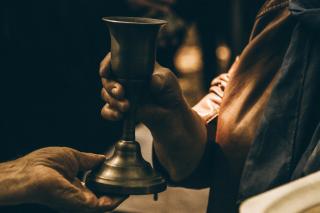Communion Institution & Invitation

While they were eating the Passover meal, Jesus took the bread in his hands and began to speak. “I am working to create infinite Justice, and I will never stop as long as I live.” He looked around at them. “But you know as well as I do that ‘as long as I live’ isn’t going to be very long. Even now there is a price on my head. Should I stop then? Should I cave to the threats against my body?”
Some of them wanted to shout “YES, STOP and stay safe!” but they didn’t dare. Jesus, seeing their fear, spoke deliberately, breaking the bread as he went on. “I. Will. Never. Stop. Just as this bread is broken so that the hungry may eat and be nourished, so my body will be broken because of my efforts toward the liberation of everyone marginalized and oppressed.” He passed the bread around. “Eat. And whenever you share bread, share in the work of my body, in my life. Work for justice and remember me.”
He took the cup after supper and said, “They may break my body but they cannot break my spirit, because you have promised to continue my work even when I am gone.” He looked at them, each in turn. “Do you remember your promise? …My blood is about to be poured out because I refuse to stop fighting for Justice.” He passed the cup around. “Drink from it, all of you, and remember that you promised to drink of my cup, to follow in my footsteps, to keep challenging oppression and to carry on fighting for the liberation of those marginalized among you, just as I have done, no matter what. This cause is bigger than my life, and it’s bigger than yours. There are no guarantees of success, but you promised to keep fighting, to share in my work, no matter the cost. Whenever you drink this cup, renew that promise in your heart. Renew your commitment to justice, live in hope, and remember me.”
Days later, Jesus was crucified. It could have been just another execution of a fanatical rebel… the victory of fear… the death of hope for a better world. But Jesus’ disciples took his words to heart, and they remembered. Every time they ate and drank, the bread nourished the work of their bodies, the wine reminded them of their promise, and gave them enough hope to return to the world and continue their struggle for liberation and justice. The meal, the intentional remembrance, and the continuation of the work helped transform the execution of this man’s body into the resurrection of a spirit of justice; turned the death that is despair into the resurrection of hope. And that spirit of justice, that life in hope spread over many continents and among many people.
Some people engaged in the struggle for justice today call themselves Christians, in his honor, and as another way to remember their promise. Others have different identities, different memories, different sources of hope, yet their struggle is no less. Jesus’ cup and cause was not his alone, wasn’t even his first. The work of liberation had millennia of history before he ever showed up, and he, too, was carrying on someone else’s legacy. Still, no matter what name we call ourselves, no matter which stories we hold sacred, we, too drink the cup that Jesus drank when the cost of Justice is no barrier to our work toward liberation.
Jesus called his vision of a liberated world of infinite justice the Kingdom of God; he didn’t see it realized, though he died trying. His disciples, too, died still striving for that Kingdom. These 2,000 years later, on an unnaturally warming earth where swastikas are drawn on holy walls, where transgender children are interrogated on their way to the bathroom and black children are killed in the park, where the disabled have to enter through the back door because that’s where the ramp was installed, and even our drinking water isn’t safe… In this world, we might begin to think fear has won and justice can never be realized. But for the sake of my children and all those yet to come, I promise not to give in to the fear and despair.
I invite you now to join me in that promise: to continue the struggle for life, liberation, and justice even when it’s hard, when it feels impossible, when it hurts so badly we’re sure that we’ll die. This invitation to eat and drink does not rest on any identity, does not rest on perfection, but rests only on a vision and a promise. Come Christians. Come Atheists. Come Jews. Come Pagans. Come Muslims, Hindus, Buddhists, Jains. Come, Unitarian Universalists, seekers, skeptics, and wanderers. Come young and old, come flawed and broken people who are tempted to give in to despair in every moment. If you yearn to live in hope and are willing to keep working for justice at any cost, please come forward now, and share in this meal as a sign of your promise and a remembrance of those who have died in the work we continue. If you would prefer to remain in your seat, raise a hand and we will come to you. Come, be nourished, and renew your hope.
| Date added | |
|---|---|
| Tagged as |